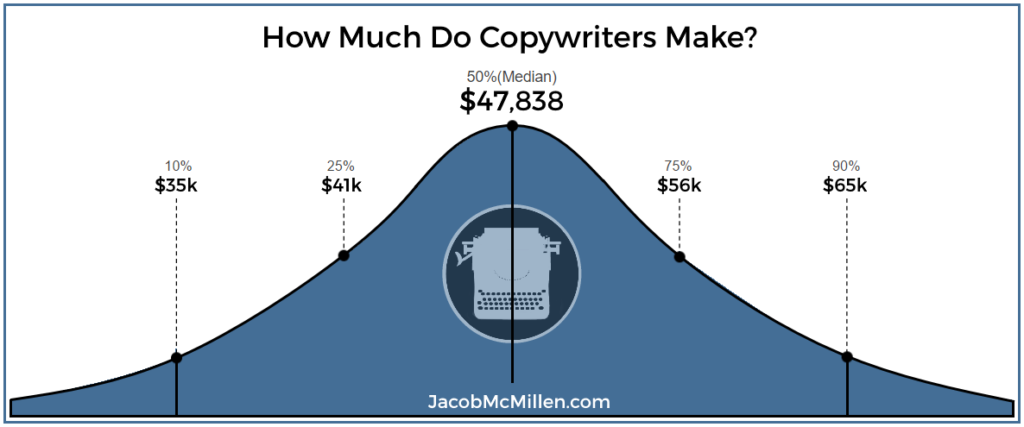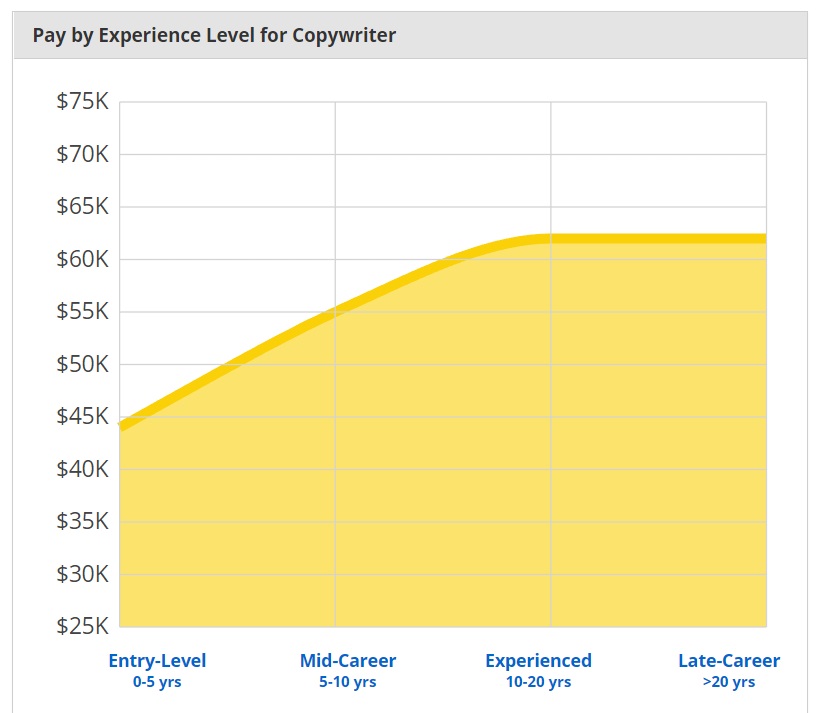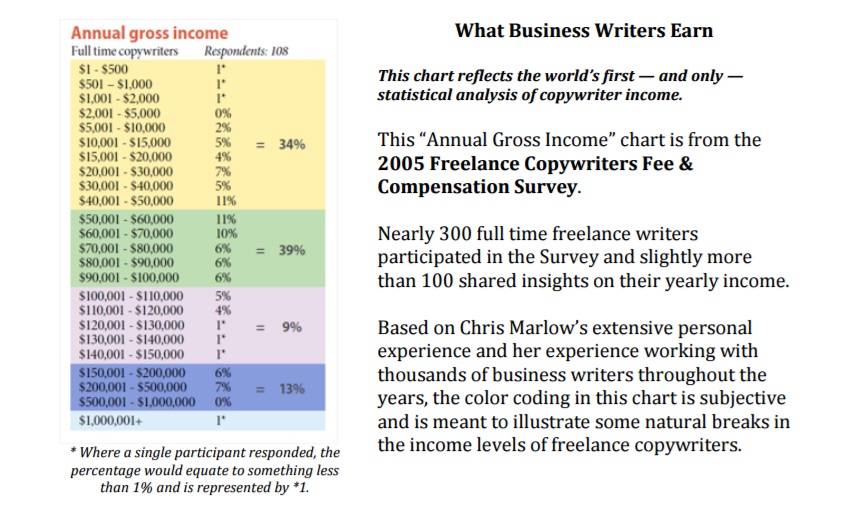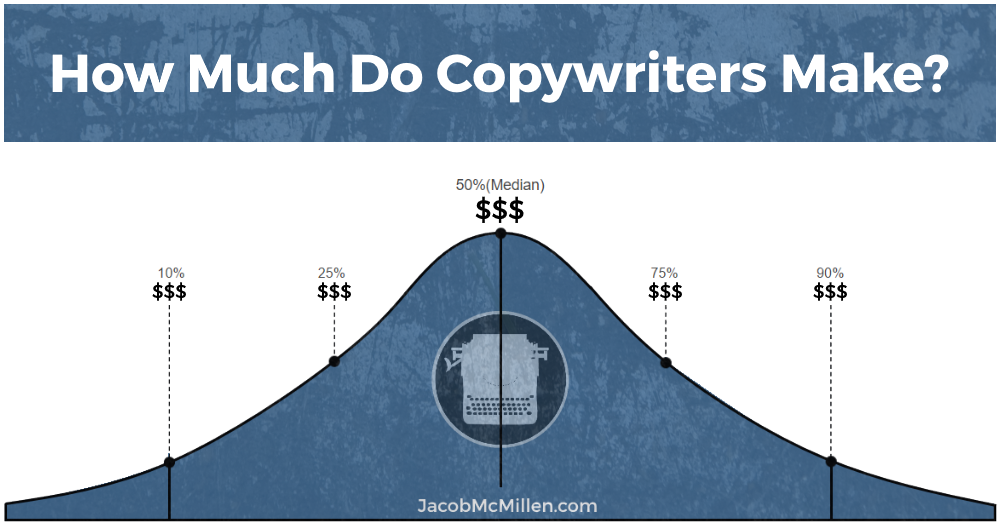How much do copywriters make? What sort of copywriter salary can you expect if you pursue this career path?
That’s the real question, right? Show me the money.
Whether you’re a “just pursue your passions” type of person or a “shut the f**k up and work hard” sort of individual, earning potential is going to be an important consideration in whatever career path you choose.
So what is your earning potential in the field of copywriting?
My goal today is to provide you with the best possible answer to that question. We’ll look at the different types of copywriting careers, review salary ranges & averages, and discuss outliers. By the end of this post, you should have a pretty thorough understanding of what to expect if you pursue a copywriting career.
Let’s get started.
How Much Do Copywriters Make?
How much do copywriter’s make?
The median annual copywriter salary is $47,838, with 80% of copywriters earning between $35k – $65k per year according to data aggregated from Payscale and Salary.com.

The two primary factors driving salary levels are location and experience:
- A junior copywriter in Medford, OR will make an average of $42k per year.
- A junior copywriter in Sacramento, CA will make an average of $45k per year.
- A junior copywriter in New York City will make an average of $61k per year.
- A senior copywriter in Medford, OR will make an average of $65k per year.
- A senior copywriter in Sacramento, CA will make an average of $71k per year.
- A senior copywriter in New York City will make an average of $93k per year.
As you can tell from these numbers, copywriting offers a comfortable living in smaller cities and a potentially lucrative career in the biggest cities. And while certain employers will require onsite employment, many businesses these days are comfortable employing remote workers, allowing some copywriters to earn big-city salaries while living wherever they wish.

Ultimately, however, there is only so much we can learn from industry-wide averages. To really get a feel for how much copywriters make, we’ll need to dive into the three distinct copywriting career branches.
Copywriting Careers: Freelance vs Agency vs In-House
If you’re a copywriter, you fall into one of three career branches:
- Agency Copywriter
- In-House Copywriter
- Freelance Copywriter
If you look at a typical white collar career path, you will often see individuals starting at a firm or agency for the first few years of their careers, then moving on to in-house positions for a decade or two, and possibly branching out to start their own business or practice towards the back half of their careers.
This is a perfectly viable path for copywriters as well, although it’s certainly not the only path. Many copywriters spend their entire careers in just one branch, while others change branches multiple times throughout their careers.
To understand which path is best for you, you’ll first need a better understanding of each branch.
1. Agency Copywriter Salaries & Experience
The average Joe doesn’t know what the word “copywriting” means.
“Like… a copyright? Where they can’t copy your work?”
Those who do know what copywriting is, but aren’t actual copywriters, will usually picture an agency environment… and probably one resembling this:

For those who have actually worked at an agency, however, memories look more like this:

Advertising, marketing and other creative agencies are typically great places to network and learn but horrible places to try and build a career.
On the plus side, you can expect:
- Decent to outstanding on-the-job training
- Opportunities to learn from industry veterans
- Exceptional networking opportunities
- Competitive entry level salaries
- Experience working with enterprise brands
This is all assuming you are working for a competitive, successful agency. There are thousands of agencies, and many of them won’t offer any of these benefits, while retaining all the downsides of working at an agency.
And speaking of the downsides, you can expect:
- To be consistently overworked
- To work primarily on boring projects
- To receive little (if any) credit for anything you create
- To deal with entrenched office politics
- To have few (if any) opportunities for advancement
Basically… all the shit you’d want to avoid in a long-term career track. There will always be anecdotes of people with great, longterm agency experiences, but if you join an agency expecting the best years of your life, you’re gonna have a bad time.
But what about those salaries? How much does an agency copywriter make? I went through nearly 1,000 salary listings on Glassdoor and manually separated agencies from non-agencies to bring you the following data:
- The average agency salary for a junior copywriter is $47,037
- The average agency salary for a senior copywriter is $88,210
As I discussed in this section and as you will see in the next section, agencies tend to pay a bit less on the frontend and a bit more on the backend, which is mainly due to the fact that they are staffed primarily by young talent with few employees staying on long enough to reach senior levels.
2. In-House Copywriter Salaries & Experience
There are very limited opportunities for advancement in firms and agencies, but some people will inevitably climb through the ranks, ending up at the top with phenomenal salaries or partnership cuts and spending their entire careers in one place.
If that’s what you want, then you need to be one of the following:
- Insanely connected and a pro at playing politics
- Unbelievably talented and a noteworthy performer
- Very patient and really f**king lucky
For most people in any sort of professional career, these options aren’t going to cut it, and the 3-5 year mark is the standard point to transition into a higher paying in-house position.
Working as an in-house copywriter for a non-agency is where you will either learn how to get legitimate, long-term results for a business… or learn how to coast your way through the rest of your career. The benefits can include:
- Competitive mid-career salaries
- Getting to focus 100% of your attention and energy on one business
- Relatively clear promotion tracks
- Being part of a team invested in achieving long-term growth
- Resources to experiment with new approaches and strategies
- Advanced data tacking and analytics

This is where you can really define and launch your career. In-house copywriters can often move into marketing director positions and beyond. If you are part of a team that drives long-term growth for a company, you will be in a fantastic position to field lucrative offers from other businesses or start and grow your own business.
Of course, those are the upsides, and most only apply to growing businesses. The downsides might include:
- Managers who don’t understand copywriting or marketing
- Limited resources and strict limitations
- Frustrating office politics
- Little upward mobility in stagnant businesses
- Being among the first layoffs when things go bad

The reality of the 21st Century is that you’ll almost always need to switch companies in order to get a meaningful pay raise. Company-to-employee loyalty is non-existent. You might get a promotion or two, but rarely will it be something significant enough to come with a big time pay raise. And you WILL be dropped or replaced the moment the company feels it benefits their bottom line to do so.
That said, if your dream job is being a marketing director, this is where that happens. Or if you just want a longterm, steady paycheck at a competitive rate, an in-house position is your best bet at achieving that.
How much do in-house copywriters make?
- The average in-house salary for a junior copywriter is $48,332
- The average in-house salary for a senior copywriter is $84,667
Again, slightly more than an agency on the frontend and slightly less on the backend.
3. Freelance Copywriter Salaries & Experience
If you want to dictate your own fate, becoming a freelance copywriter should be your ultimate goal.
Traditionally, the route to this point first passed through agencies and in-house positions. Copywriters would need to spend years developing the contacts needed to support a freelance work style or launch a business.
Today, anyone can launch their own career as a freelance copywriter… essentially from scratch. If you can make a sale, you can be a freelancer. You’ll need to “git gud” at your actual copywriting services in order to make any significant amount of money, but if you can convince someone to pay you for copywriting, you have just become a freelance copywriter, regardless of your actual skill level.
Freelancing comes with some unique benefits:
- Be your own boss
- Dictate your own schedule
- Give yourself a raise whenever you wish
- Decide what you work on and who you work with
- Take your career in any direction at will
- Incur minimal expenses
- NO COMMUTES!
Freelancing offers the most benefits for the least amount of work. Land clients. Do the work. Get paid. Repeat. It’s a very simple, straightforward business model, and with the ever-growing percentage of work allocated to contract hires, there has never been a better time to be a freelancer.
But of course, freelancing isn’t free. There are some significant downsides:
- Income can be volatile and unpredictable
- Every part of the business depends on you
- Virtually all learning & growth must be self-driven
- No benefits or 401k matching
- Have to pay self-employment tax
- Requires significant discipline and self-management
- Extroverts will struggle working alone
If you’ve never spent a year or more freelancing, many of these downsides probably seem like trifles, but the reality is that there are some pretty massive disadvantages here.
One of the most underappreciated aspects of entry level work is the sheer amount of education and experience you are exposed to in a relatively short amount of time. You are essentially getting paid to be trained, and even as you continue along your career path, you will constantly be rubbing shoulders with more experienced people than you.
As a freelancer, you are on your own. You will hopefully develop a network of writing veterans and glean some things here and there, but 90% of your learning and growth is on you. That sucks.
Furthermore, employees often don’t realize just how much non-salary money their employers spend on them between healthcare benefits, payroll taxes, and 401k matching. For a typical package accompanying a $50,000 salary, the employer will end up paying an additional $15,000 in non-salary costs. That’s an additional 30% of your salary, and it disappears instantly the moment you leave your job to become a fulltime freelancer.

Since this can all be made up for and then some by simply earning more, it’s not really a downside for veteran freelancers, but it can definitely be a shock to the system for new freelancers transitioning out of fulltime employment.
At the end of the day, freelancing comes down to sales. Can you sell yourself, and then can you sell other people’s stuff through the copy you write? If you can do both of those things, it’s going to be an absolute homerun for you. If you can’t, it’s going to be an absolute nightmare.
It’s hard to get an accurate read on how much freelance copywriters make on average. Most reports are old and have a fairly small sample size. Newer reports lump in part-time copywriters and other types of freelance writers, most of whom earn significantly less than fulltime copywriters.
Here’s the best survey I was able to find:

From a statistical standpoint, I’m very skeptical of any results that don’t adhere to the standard bell-curve distribution. At the same time, I do think it’s worth noting that there are a lot of people out there making big time money in copywriting.
For example, I went full time in 2016 and earned around $80k. I netted around $130k the following year and $220k in 2018. You can learn about how I became a six figure copywriter here.
I’ve also met plenty of copywriters struggling to hit $20k, although they are usually in their first year. There’s no guarantees that you will succeed, but frankly, if you want it bad enough, I feel like it’s virtually impossible to fail in today’s contract climate.
Next Steps: How To Become A Copywriter
If becoming a freelance copywriter appeals to you, I’ve put together a 2-week crash course to help you get up and running AND LANDING PAID GIGS as quickly as possible.
This course takes you down the same road I followed to go from $15 per article to $15k per month, but without all the mistakes, missed opportunities, and video game hours played along the way (screw that, play the hell out of those video games).
If you’re an ambitious writer with a lot of hustle and self-drive, this plan can get you to six-figures in as little as 12 months. You’ll learn:
- The three types of writing that can easily support a six-figure income.
- How to land high paying gigs, even if nobody knows who you are, and you have no connections.
- How to bring a stream of quality clients straight to your digital doorstep, no cold calling required.
Enter your email below to enroll in the course, completely free.





